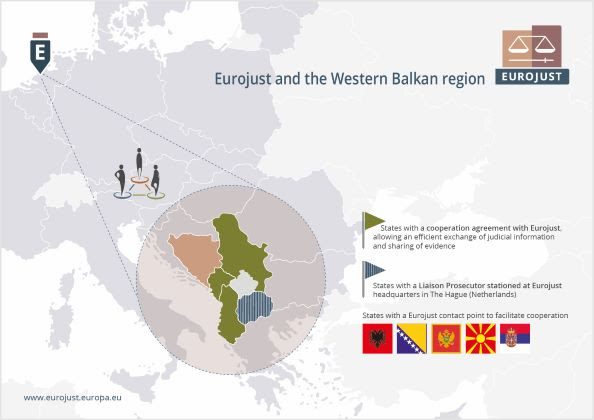The potential for enhanced operational and strategic judicial cooperation and the sharing of information and evidence between Eurojust and Serbia have been made possible today by the signing of a Cooperation Agreement.

The signing ceremony took place in Belgrade. The Minister of Justice of Serbia, Nela Kuburović, and the President of Eurojust, Ladislav Hamran, signed the agreement, which will enter into force after all requirements have been fulfilled.
Mr Hamran said: ‘I am very pleased to conclude this cooperation agreement with one of our key partners in the Western Balkans. Closer ties will help to make Europe safer. Serbia can benefit from our practical cooperation tools in the prosecution of serious cross-border crime cases. Cooperation and mutual trust can lead to a more successful fight against crime in the region.’
Ms Kuburović said: ‘The Republic of Serbia has significantly strengthened its capacities in combatting transnational organised crime by signing a Cooperation Agreement with Eurojust, particularly bearing in mind that crime and criminals do not respect or recognise national borders. Therefore, close cross-border cooperation and effective exchange of information between competent Serbian authorities and our esteemed European partners are vital and essential elements for determined action against this form of crime.
On the other hand, by adopting the new Law on Personal Data Protection, as a prerequisite for concluding the Cooperation Agreement, the Republic of Serbia has fully aligned its legislation with corresponding European Union regulations and directives, hence taking a step forward towards the European membership within the EU accession process.’
Eurojust has already signed cooperation agreements with three States in the Western Balkans: North Macedonia (2008), Montenegro (2016) and Albania (2018). The cooperation agreement with Albania entered into force at the beginning of this month.

In the period from January 2015 through the end of October 2019:
- Serbia and Eurojust worked together on 143 cases involving serious organised crime, with offences ranging from money laundering, drug trafficking, swindling and fraud, to crimes against life, limb and personal freedom;
- Serbia attended 23 Eurojust coordination meetings; and
- Serbia participated in six joint investigation teams, most of which involved drug trafficking cases.


With today’s agreement, Serbia will be able to share personal data and evidence with prosecutors and investigators from all over Europe. The agreement also creates the possibility to appoint a Liaison Prosecutor to Eurojust in the near future to improve cooperation.
Eurojust now has cooperation agreements with 12 countries.

Photos © Danilo Polovina, Book of Life



